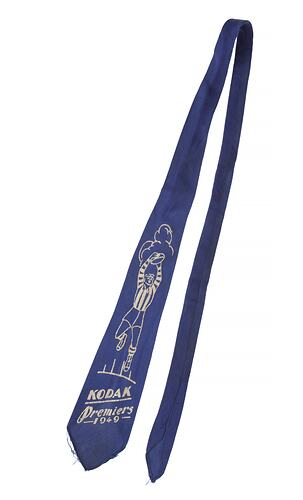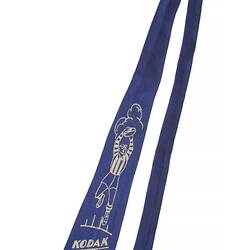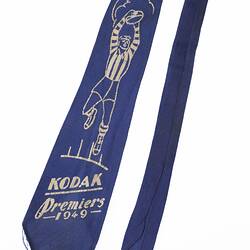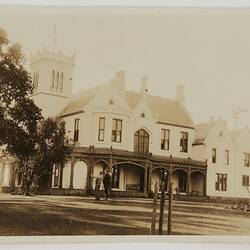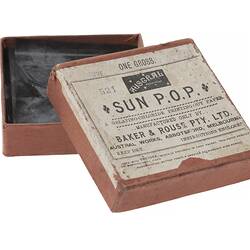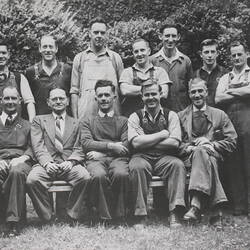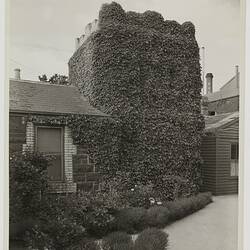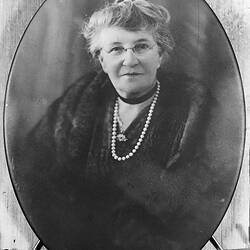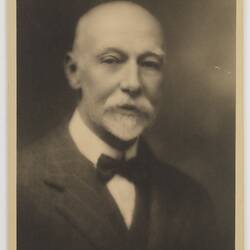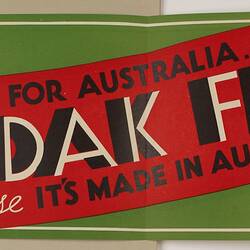Summary
Tie celebrating the Kodak Australasia Pty Ltd football team winning the 1949 C Grade VFASD Australian Rules football premiership.
The tie was donated by Mr Walter Whitworth, ruck of the Kodak football team, who told Museums Victoria that he kicked the winning goal in the premiership match. He recalled that Kodak's Managing Director, Mr Edgar Rouse, was so thrilled with the premiership win by the company team that he presented all of the players with specially made 'premiers ties', and also generously gave the team a weekend away at a hotel in Cowes on Philip Island as a reward for their great sporting achievement. Walter proudly wore his tie for years afterwards at special events, including at the Kodak Balls held at the St Kilda Town Hall.
Walter Whitworth started work at Kodak in 1946 and left about 1952. He worked as a maintenance mechanic in the Kodak garage, but also drove the company coal truck as well as driving executive staff including the Managing Director Mr Edgar Rouse and company secretary Mr Paige when their usual driver was away. He also drove the football and cricket teams to their games on weekends, and along with other staff drivers, drove a range of staff to work during the 9 week transport strike in 1950, to keep the factory operational.
Part of a small group of photographs and football premiership related objects that Walter Whitworth has donated to the Museum. An oral history was also conducted with Walter about his working and social life at Kodak.
Physical Description
Dark blue fabric tie with illustration of a footballer marking a football in front of goals, and an inscription.
Significance
This tie enhances our understanding of photographic manufacturing and retailing in Australia, and specifically traces the history of Kodak and its workforce in Australia, bringing the factory workers to life through a piece of clothing that tells a story about a company football team premiership win. This particular item not only tells the story of sport and recreation among Kodak workers, showing insight into a different aspect of working life at the company, but it also feeds into the larger story of workplace sport, and specifically football, which had been a popular pursuit in Melbourne, especially in the interwar years.
During its heyday, workplace football was significant in working class identity, culture and politics. It also played a role in industrial relations through promoting company values and employee harmony. The paternalistic gesture of providing a tie to the Kodak football team for their sporting achievement highlights the strong family culture that Kodak promoted among its staff. Workplace football also contributed to the changing nature of the football game and spectatorship.
Following WWII, workplace football underwent a gradual decline and by the end of the twentieth century it had largely disappeared. As industry had shifted from its previously male dominated, inner-city domain to include more women in the workforce in new outer suburban locales after WWII, there was less interest in workplace football, especially as the link diminished between where people lived and worked, and company related sport required travelling across the city away from home. Increased leisure time and new leisure opportunities, a more affluent society and lifestyle changes in the post-war also contributed to a shift away from company based sporting activity.
More Information
-
Collection Names
-
Collecting Areas
-
Acquisition Information
Donation from Walter Whitworth, 13 May 2014
-
Organisation Named
Kodak (Australasia) Pty Ltd, Southampton Crescent, Abbotsford, Greater Melbourne, Victoria, Australia, 1949
-
Inscriptions
Front, bottom, printed, cream: 'KODAK / Premiers / - 1949- '
-
Classification
-
Category
-
Discipline
-
Type of item
-
Keywords
Manufacturing, Manufacturing Workers, Photography, Sport, Football, Pennants, Flags, Games, Competitions, Staff, Staff Relations, Awards
